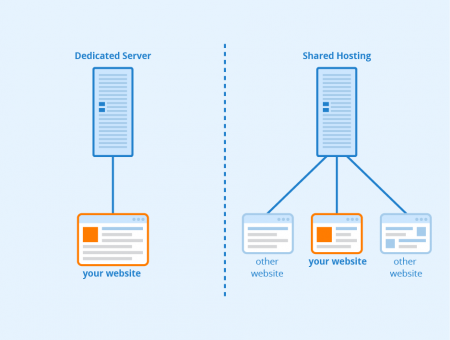Dedicated Server
Contents
Definition

A dedicated server is a server that exclusively performs a specific task or is assigned to a single user. Other frequently used terms are root server (especially for hosting providers and Internet Service Providers (ISPs) who operate complete infrastructures) or bare metal server. The special feature of a dedicated server is that it uses all resources for a single purpose. Otherwise, mixed use is often preferred for reasons of maximum load distribution. Dedicated servers are usually operated "headless", i.e. without peripheral input and output media such as screen, keyboard or mouse. In this case, administration, configuration and access to data or services are performed exclusively via the network. Graphical interfaces such as web UI (e.g. Plesk, DirectAdmin, Webmin, cloud services), tools for remote access (e.g. VNC), or text-based consoles (e.g. RSYNC, SSH) are available for this purpose.
Dedicated to a customer vs. dedicated to a service
In the case of commercial hosting, a dedicated server usually refers to a whole computer including RAM, processor, and drives that is exclusively available to a single customer (= "dedicated to a customer"). The customer is practically the owner and can access the rented hardware, its resources, and the operating system without restrictions. This makes it possible to install your own software, modify the operating system, restrict public access or set limits for memory and storage media.
In contrast to such a dedicated root server, a server dedicated to a service is specialized for a specific task (= "dedicated to a service"). This makes sense for performance reasons, as both the operating system and hardware can be optimized for a fast reaction. Operating a responsive database, for example, requires other prerequisites than (cost-)efficient hosting. During operation, such service dedicated servers process requests faster, since only very few programs use the capacities and temporary data is stored longer.
When is a dedicated server necessary?
Service dedicated servers are part of the IT infrastructure of hosting and cloud providers or ISPs. However, few companies offer them to their customers as a special service. Instead, they organize their network according to their own priorities such as efficiency, utilization, load distribution, and data volume. It only pays off to offer dedicated servers for certain services once a certain amount of capacity has been used. Otherwise, there’s a significant increase in workload and investment, which is in no reasonable balance to the increase in performance within the network.
Therefore, individual customers usually won’t be offered a service dedicated server, but maybe a dedicated root server might be suitable for their purposes. In different application scenarios, this has specific advantages and disadvantages, whereby the disadvantages primarily lie in higher costs. Dedicated servers are therefore only recommended if the customer has specific requirements, such as:
- Very responsive systems with a short server response time (SRT)
- IT infrastructure with high data and system security requirements
- Special environments, e.g. for the operation of virtual computers
- Operation of own cloud services with a strongly varying workload
- Permanent availability with high performance, e.g. for business solutions
- Complex environments with above-average resource consumption
Some of these requirements are also met by cloud services - but these mean a loss of control over one's own infrastructure and are ruled out especially in security-relevant areas.
Benefits
Since the dedicated hardware is rented exclusively to one customer, they can scale the system perfectly to their requirements. In addition to packages with predefined price models, flexible hosting providers often also offer an individual combination with different components such as RAM, computing power, and drive capacity. This enables each customer to perfectly tailor the operating system and the services offered to their needs. Another great advantage of dedicated hardware certainly is that it uses its resources exclusively for the customer’s interests. Since hosting providers guarantee the bandwidth of the network connection independently, dedicated servers are therefore quickly accessible and enable a high transfer rate.
Virtual private servers (VPS) as an alternative
A VPS offers many advantages of dedicated servers at significantly lower costs. In this approach, a powerful central computer virtualizes the hardware of multiple servers with (largely) independent operating systems (OS). All users share the same physical hardware but work almost entirely in their own environment, depending on the virtualization software used. This consists of a simulated computer with an independent operating system. The highest instance (host) is often a high-performance cluster that automatically distributes resources among all VPSs according to the booked packages.
Importance for Search Engine Optimization (SEO)
With conventional shared hosting, there may be negative effects on search engine optimization (SEO), depending on the other websites hosted on a server. For example, if the IP address of the server is registered on a blacklist because of the wrongdoing of an individual user, or if it has been downgraded by search engines because of black hat SEO, this will have a negative effect on all other websites hosted on the server. In addition, a high computing load - for example, because many web pages are stored on one server - can lead to slow response times and thus high loading times. For search engines such as Google, however, pagespeed is an important ranking criterion that is used to rate websites. Long response times can lead to lower rankings and should be avoided at all costs. A dedicated server can be an effective solution in this case, but it isn't the only option. If your website has low page speed, this can have many causes and you usually have a lot of different options to improve it.
Related links
| About the author |
 |
Related articles